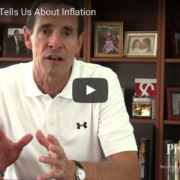Improving Investor Behavior – Act Like an Owner
Most business owners can feel the pulse of their business. If you own a coffee shop for instance, you can go to the location, see and interact with your employees, touch your inventory, and keep your customers happily caffeinated. You can smell the aroma of your business. You can feel it.
What if you had that same feeling as a shareholder of a public company? What if you thought like an owner? Consider one that sells coffee. Yesterday, you did not own any shares of this company, but today you are an owner – a shareholder. The feeling of being an owner of that company is divorced from owning a percentage or shares in a public company. Some may think those shares represent a lotto ticket that goes up and down every business day on some stock exchange, based on public consensus or what some analyst says or does not say about that company’s future prospects. Some almost consider it like a casino.
But when you think like an owner your perspective changes. Owning a share of that business can be an abstract thought. Owning your own coffee shop worth $1 million is just as valuable as owning $1 million worth of stock in that public company. You don’t control the public company like you control your own business, but they have the same value. If your genius is anything other than running a business daily, likely you are better off with a passive equity ownership.
Make no mistake, you are an owner of that business, albeit a minority owner, but still an owner! When you invest in shares of that company, you are not just buying numbers on a screen or in your account somewhere that goes up and down in price; you are buying real ownership in that business.
The beauty of the stock market is you can choose businesses in which you want to be part owner. Our whole investment philosophy is to own great consumer companies that sell their goods and services to everyone, every day, everywhere. Companies that can do that, can make a profit which can be shared with shareholders via a dividend. That’s a tangible result of owning a part of the business. Dividends don’t lie.
Being able to walk into a business of which you are an owner/shareholder offers a feeling of ownership one can not experience when owning shares of a mutual fund, exchange traded fund, or any other financial product. And unlike running your own business, there is no day–to–day responsibility of opening the doors at 4:30 am, closing at 10:00 pm, or managing payroll. Your only responsibility is to “open the envelope” each month when your investment statement arrives.
Good investor behavior also means you know, or can explain with two or three sentences, what you own. This is one of Warren Buffett’s fundamental principles. Peter Lynch once said, “Never invest in an idea you can’t illustrate with a crayon.” You don’t need to make hundreds of successful investments over your savings and investing lifetime. Rather invest in those companies that you know, and can reasonably predict with a level of confidence that their products and services will be in demand, or that the management of the company will navigate the company for the benefit of the owners (you).
It has been said that the average time someone used to hold a share of stock back in the ’60s was eight years. Now, it is claimed the average time is four months. We call this renting your investments. Buying and selling, re-balancing investments to be “active” or “demonstrate management” is akin to playing gin rummy with your investments, discarding and drawing from a deck of cards. Ideal owners make investments where the holding period is “forever”.
There are many great and wonderful companies that are publicly traded, where the leaders, managers, employees work diligently to improve their product or service to their customers every day to deliver what they do better, faster, cheaper.
Good investment behavior starts with an attitude of ownership.
Steve Booren is the Owner and Founder of Prosperion Financial Advisors, located in Greenwood Village, Colo. He is the author of Blind Spots: The Mental Mistakes Investors Make and Intelligent Investing: Your Guide to a Growing Retirement Income and a regular columnist in The Denver Post. He was recently named a Barron’s Top Financial Advisor and recognized as a Forbes Top Wealth Advisor in Colorado.








